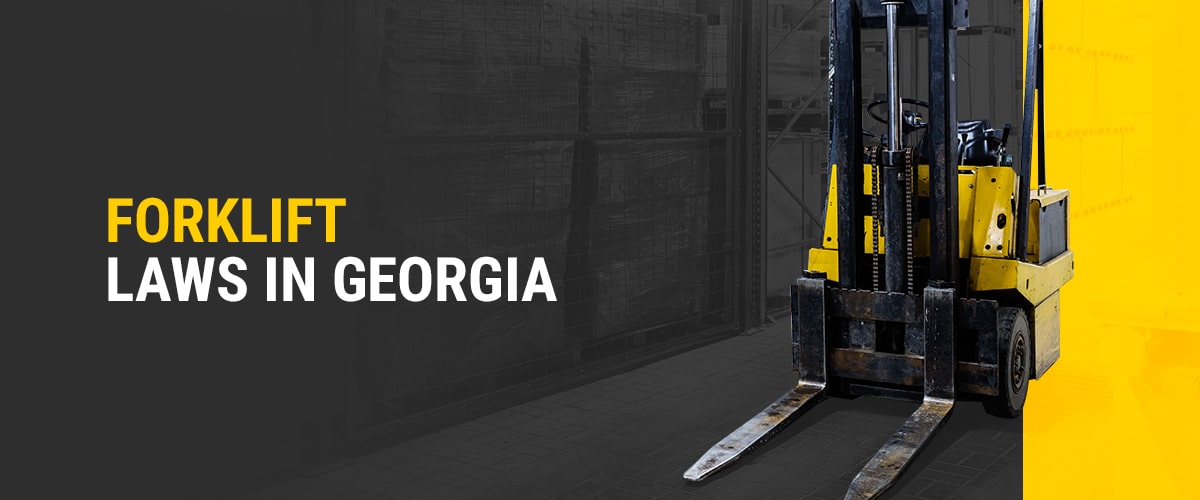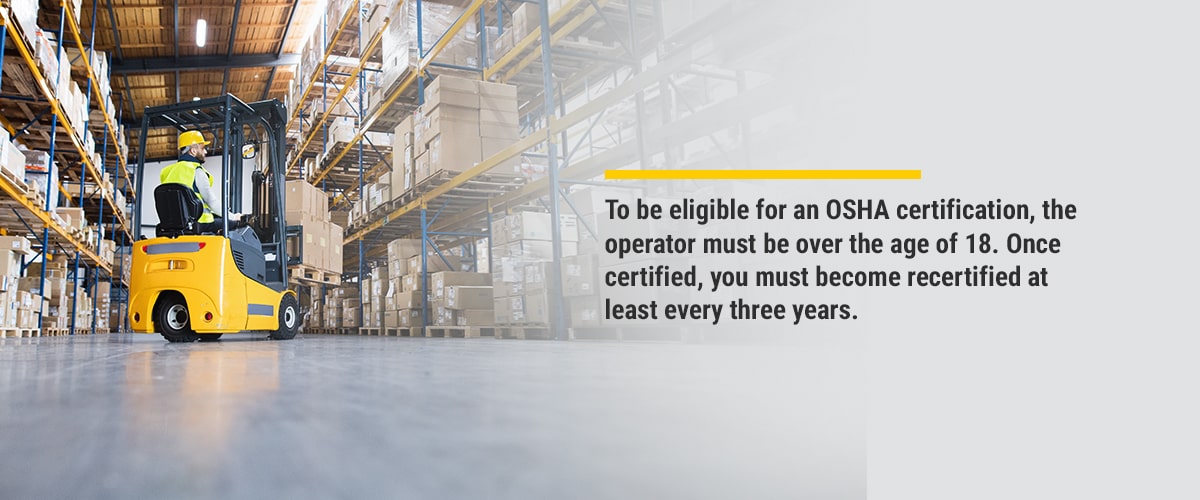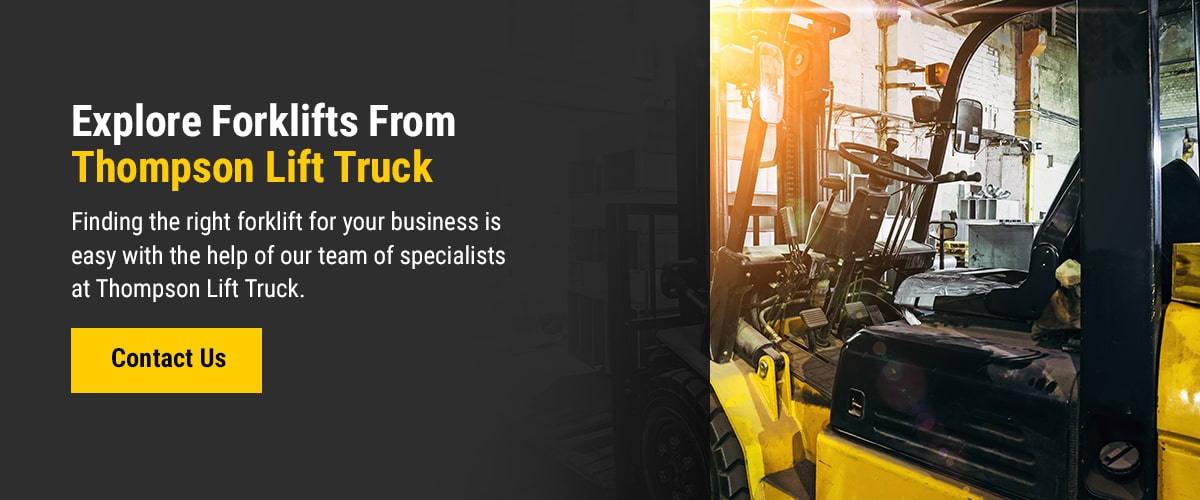
Forklift Laws in Georgia

If you operate a forklift, you must understand and abide by the laws. Regulations are in place to keep those who work with and around heavy equipment out of harm’s way. Each state has its own set of guidelines that operators should be aware of to avoid paying fines. In the state of Georgia, there are special rules regarding training, seat belts, forklift attachments and more.
To make it easy on you, we’ve broken down forklift laws and compliance so you have the information you need to know to work safely and legally. Learn more about forklift laws in Georgia.
What Are Georgia’s Forklift Regulations?
When it comes to forklift laws and regulations, each state has its own set of guidelines. Some states, like California, have specific requirements for operating forklifts upheld by the state governing body. Others choose to abide by the United States Occupational Safety and Health Administration (OSHA) for workplace requirements and forklift regulations.
Ignoring forklift laws can be detrimental to your business. OSHA and other government organizations design these regulations to keep people safer while working. These rules help to maintain safety standards and avoid unnecessary accidents on job sites.
By ignoring state-mandated regulations, not only do you heighten the possibility of an injury or death on the job, but you also risk having to pay fines and compromising your business’s reputation.
Georgia does not have a federally adopted forklift program in place. Instead, the state turns to OSHA’s workplace safety and health requirements for private sector workplaces, meaning there are no additional laws or regulations from the state government regarding the operation of a forklift.
What Are the OSHA Regulations for Forklifts?
Since Georgia abides by OSHA regulations, we are breaking down the organization’s set of rules regarding the operation of forklifts. These requirements fall under OSHA’s 1910.178, which outlines rules for powered industrial trucks.
OSHA Training and Certifications
According to 1910.178(l)(1)(i), OSHA requires forklift operators to successfully complete designated training and evaluation before working with the equipment.
To be eligible for an OSHA certification, the operator must be over the age of 18. Once certified, you must become recertified at least every three years. Businesses that involve the operation of powered industrial trucks have to develop and carry out a program for forklift operator training, certification and renewal.
To earn OSHA certification, an operator must engage in formal instruction. This may include lessons in the form of video presentations or a series of courses taught by a certified trainer. An OSHA training program will include both truck-specific and workplace-related topics.
There are two types of OSHA training courses for forklift operators. The first is the 10-hour course for employees who need certification and the second is the 30-hour course for managers and supervisors that are responsible for enforcing workplace safety.
OSHA forklift training law also requires operators to engage in training for vehicle inspection and maintenance. It is important for those working with powered industrial trucks to truly understand forklifts and what it takes to maintain optimal performance and safety.
OSHA Forklift Compliance
In addition to needing training, there are other OSHA forklift regulations that operators and businesses must follow in the state of Georgia.
Some of the most important requirements outlined in OSHA 1910.178 include the following:
- Daily inspections: OSHA requires operators to conduct inspections according to daily checklists to ensure proper vehicle functioning and safety.
- Safety: Operators must abide by safety regulations such as avoiding overloading the forklift and operating at certain distances from people and other equipment.
- Operation: There are specific rules for where you can operate a forklift and the maximum speed you can travel. It is also essential for those driving a forklift to abide by the manufacturer’s operational guidelines to meet OSHA standards.
OSHA Forklift Attachment Compliance
When it comes to forklift attachments, there are a few potential hazards, including:
- Overloading
- Tipping over
- Falling loads
To ensure operators and those working close by are safe, OSHA has attachment-specific requirements for forklifts. Operators must have training based on the attachment they are using. They must also avoid exceeding the forklift’s rated capacity and treat a vehicle with attachments as partially loaded. Just like with the forklift itself, operators have to conduct inspections and maintenance on the attachments as well.
OSHA Violations
Forklifts can be very dangerous for many reasons, including:
- Size: Forklifts can weigh more than two tons and pose a serious threat if they are not operated properly.
- Jobs: Because forklifts lift and move heavy materials at high heights, they can pose a serious safety threat.
- Load size: A full load can obstruct the operator’s view when driving a forklift.
- Brakes: These machines feature a front-wheel brake system that can make bringing the forklift to a stop more difficult.
- Rear-wheel drive: Forklifts with rear-wheel drive are more susceptible to tipping over.
- Weight distribution: Operating a forklift can be especially challenging if there is uneven weight distribution on a forklift.
If a business chooses to ignore OSHA regulations, it could face serious fines. OSHA penalties can be very costly. In fact, the maximum penalty amounts range from $15,625 t0 $156,259 per violation.
Forklift Seat Belt Laws
Seat belt laws for forklifts in Georgia are a little peculiar and confusing. Surprisingly, neither OSHA nor the American National Standards Institute (ANSI) has specific provisions for the use of a seat belt while operating a powered industrial truck such as a forklift.
While there are no requirements for utilizing seat belts on these machines, there is an OSHA regulation from the OSH Act of 1970. It states employers must offer a place of employment that is free from recognized hazards that could lead to serious harm or death.
This regulation leaves the enforcement of wearing a seat belt while operating a forklift up to the employer’s discretion in Georgia. However, OSHA mandates that employers require their workers to utilize operator restraint devices and seat belts if they are present in a powered industrial truck.
Explore Forklifts From Thompson Lift Truck
Finding the right forklift for your business is easy with the help of our team of specialists at Thompson Lift Truck. In addition to excellent customer service, we pride ourselves on offering high-quality forklift equipment and a vast selection of rental options.
Our experts can provide you with the insights and services you need to minimize downtime and get the most out of your equipment. You can count on Thompson Lift Truck for high-quality machinery to support your operation.
Are you interested in renting or buying a forklift? Contact Thompson Lift Truck for more information today!


